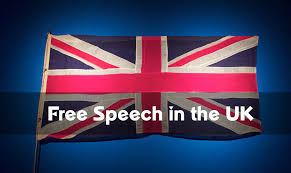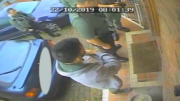There has been, quite rightly in my view, a lot of positive attention shown towards the You Tube comedian Count Dankula, following his conviction and sentence on dodgy ‘hate speech’ charges. I’m also really pleased to see that he has managed to raise £100,000 from donations in order to pay for his appeal against his conviction under Section 127 of the Communications Act 2003. I really hope he wins this appeal. A win would be not only a vindication for Count Dankula, but also a step towards giving Britons back much of the free speech rights that we have lost over recent decades, especially since the Blair government took office in 1997.
But Count Dankula, real name Mark Meechan, is not the only one to be criminalised by the use of the Communications Act to punish ‘wrong think’ or words or images that some people find ‘offensive’. Count Dankula is just one case that has hit the headlines, there are thousands of other Britons who are being arrested, charged, convicted and sometimes imprisoned under the Communications Act and other dubious ‘hate speech’ laws. These Britons are not being prosecuted for any physical action that could be called a real crime, nor are they brought before the courts for making credible and believable threats of violence or death to other individuals, but often for merely expressing opinions or ‘offending’ someone.
Whilst there is a lot of attention being paid to Count Dankula, and quite rightly so, we should not forget the other Britons who have been persecuted under unjust laws, such as Section 127 of the Communications Act. We should also not forget those who have been convicted or who are facing charges under other equally oppressive laws, such as the Racial and Religious Hatred Act of 2006 or under the various Public Order Acts. These people have been arrested, intimidated by the police, dragged through the courts and sometimes harshly punished for carrying out the normal actions of a free people in a supposedly free land, actions that range from expressing opinions to cracking jokes.
Britain’s speech culture, thanks to these unjust laws and ordinances, is now so un-free that even quoting a rap lyric on social media that contained the word ‘nigga’ has resulted in some pretty harsh punishment for a teenage girl in Liverpool. Chelsea Russell, aged 19, was convicted under the Communications Act for putting up a rap lyric containing the word ‘nigga’, even though this term was regularly being used by teenagers in the Liverpool area and was put on Ms Russell’s Instagram page as a tribute to a friend who had died in a car crash. However in Ms Russell’s case, as in the Dankula case, the court completely ignored the context and her intention in using the word and convicted her anyway.
Yet again we see the state, rather than the individual, determining the context and intent of a created work can be ignored. This is not freedom, this is really a form of tyranny and it is one that should be fought. Only those who create something truly know the context in which it is created and the intent that they have for it, and that applies just as much to a teenager’s Instagram post as it does to a work of great art or a theatrical piece.
I am reminded by both the Dankula case and that of Ms Russell of the days, within living memory in Britain, when the Lord Chamberlain’s Office vetted public performances of plays for ‘offence’, which went on until 1968. Now instead of an employee of the Royal Household vetting and licensing plays for whatever reason, we have, as both the Dankula and Russell case illustrated, activist police officers carrying out similar sorts of censorship to that which was exercised by the Lord Chamberlain’s Office. These activist police officers will brazenly use their own sense of personal subjective offence, as in the Russell case, or seek out those who could be persuaded to say in court that they were ‘offended’, as in the Dankula case, and by doing so they are creating injustices. These officers are policing emotions and not real crimes. We should be very worried about the sort of policing culture that has been created and which festers unchallenged in the various ‘hate crime policing’ groups of various police forces. In the Dankula case police officers trawled and searched around to find someone who would stand up in court and say that they were ‘offended’ by the ‘Nazi pug’. They found such a person when they approached the Scottish Council of Jewish Communities, which provided a person to the prosecution who could be relied upon in court to emote on cue about how ‘offensive’ he found Dankula’s joke. This joke, it needs to be said, was one that was being made at the expense of Nazis, not anyone else, although this fact seems to have passed Police Scotland by.
In the Russell case the key witness, and it seems the major push factor for the prosecution, appears to be Police Constable Dominique Walker of Merseyside Police’s ‘Hate Crime Unit’. She is the sister of a man who was murdered in a notorious race attack in Merseyside. Although I sympathise with her loss, it seems to me that she should not be in the position where she can police language or thought. When I looked into the background of PC Walker it seemed pretty obvious to me, and probably will to many others, that this tragedy may have influenced or warped her attitude to policing. It is not a good state of affairs to have police officers being led by their personal subjective emotions and PC Walker’s actions and words show the danger of this. PC Walker comes over as very much the activist police woman. The way she has conducted herself in this case does indicate that for her the freedoms and rights of the individual may be coming a very poor second to a desire to socially engineer what she might see as ‘racism’ out of society. The way that she demanded, according to press reports, that the word ‘nigga’ was not used in open court because she found it ‘offensive’ should worry us. It is not her place to decide for a court, or for any individual, which words should be used where and what kind of language is or is not acceptable. I can’t help but think that if this officer cannot even cope with ‘offensive’ words being used as part of the evidence in a court case, what possible use is she to Merseyside police or the people who live in that area? If someone is so much of a ‘snowflake’ as to want to forbid certain words in a court of law, then she’s not going to be much use against real criminals is she?
To conclude my comment on the Russell case, I can only say that I hope Ms Russell appeals both the conviction and the sentence. Context and intention are important parts of this case, as they are with other similar cases and they have not been taken into account at all in Ms Russell’s case. I would completely understand if Ms Russell just wanted to put the matter behind her as much as she can, but her fight is also our fight, the removal of her right to speak freely is also the removal of our rights to speak freely. I would urge her to consider looking into a possible appeal against this grossly unjust conviction and sentence.
Unfortunately neither the Dankula case or the Russell case are anomalies in Britain. ‘Hate speech’ laws and the other above-mentioned legislation are being used as hammers to beat dissenting opinion out of British subjects. According to a report in Breitbart London from October 2017, British police forces were arresting nine people a day on various ‘hate speech’ or Communications Act charges. At least 4000 people have been arrested under the Communications Act alone and many more have probably been arrested and charged under other oppressive legislation such as the ‘Racial and Religious Hatred Act’ or the Public Order Acts. The figures quoted by Breitbart from an original story in The Times newspaper, are a pretty shocking indication of how free speech is suffering in the UK at the moment, but is likely to be a gross undercounting, this is because 13 of Britain’s 45 police forces either refused to provide data when requested or provided data which was useless.
These ‘hate speech’ laws and laws that have been used to crack down on what is called ‘hate speech’ have not made anyone safer in any way shape or form. They may have given some individuals the self satisfaction that their subjective sense of offence has been recognised, but these laws have impoverished society as a whole. These laws have prevented debate and have been used to intimidate people into not speaking about matters that they wished or felt compelled to speak about. I doubt very much that the have really protected any innocent members of minority groups and may even have made things worse by driving bad speech about minorities which should be debated, underground where these ideas cannot be challenged. The main users of these laws appear to have been various religious, racial or gender grievance-mongers, of various levels of mendacity and malevolence, to shut down the speech of others and to render their own ideas unchallengable.
These diverse grievance-mongers, along with police staff who now bear a remarkable and shocking similarity to the ‘Political Officers’ on board ships of the old Soviet Union, are using these laws not to stop genuine threats of violence, but instead place themselves and their particular identity politics group, above any question. That this political silencing of dissidents is done through the use of the law into instil fear into other British subjects, should disgust us all.
This is why I, as others are doing, am calling for a complete repeal of all ‘hate speech’ legislation along with passages in other legislation that is currently being used to oppress the subject’s right to speak their personal opinion. In particular as a priority, is the removal of Section 127 of the Communications Act from the statute book as it is being woefully exploited by said grievance mongers and the likes of ‘Police Constable Snowflake’ who was described earlier in this piece. I think at election time every subject who cares about their freedom and their children’s freedom should be asking candidates where they stand on the issue of free speech and the repeal of ‘hate speech’ laws. If they equivocate or support such laws then they are no longer a worthy recipient of your vote.
We need to take back many of the rights that have been removed from us, such as the right to speak freely without fear of arrest or punishment, for if we lose this right completely, it will not return. Those who care for and have a stake in the future through their children should think carefully about what a nation without the right to speak freely would be like. It is a sobering thought that if the situation regarding speech restrictions and legal oppression of free speech is bad now, just think how horrific it will be for our children of tomorrow? We need to fight the attacks on free speech not just for us in our generation but for those who come after us and to whom we have a responsibility to leave a functioning and free society.





